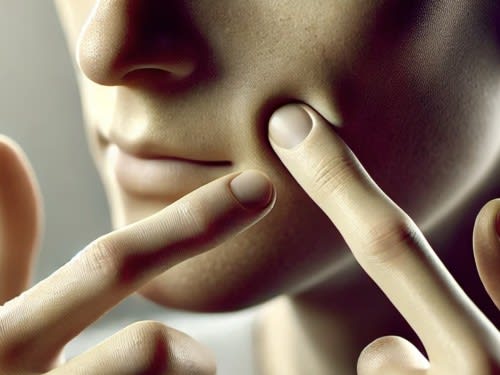Nail Biting, Skin Picking, Lip Chewing and Teeth Grinding

posted 16th January 2025
Understanding and Addressing Repetitive Behaviours
Repetitive behaviours such as hair pulling (trichotillomania), nail biting (onychophagia), skin picking (excoriation disorder), and lip biting are often dismissed as mere bad habits. However, these behaviours can signal underlying psychological distress and significantly impact a person's quality of life. Recent research and diagnostic criteria, including the DSM-5, emphasize the importance of recognising these behaviours as clinical conditions requiring specialised interventions.
Repetitive Behaviours: A Clinical Overview
The DSM-5 categorises trichotillomania and excoriation disorder under Obsessive-Compulsive and Related Disorders. These behaviours are characterised by recurrent, body-focused repetitive actions that result in noticeable damage, such as hair loss, skin lesions, or chronic discomfort. They are often performed in response to stress, anxiety, or boredom and are associated with feelings of shame, guilt, and loss of control.
Common Conditions and Triggers
Trichotillomania: The compulsive pulling of hair from the scalp, eyebrows, or other parts of the body. Celebrities like Olivia Munn have openly discussed their struggles with trichotillomania, shedding light on the emotional toll and the need for support.
Excoriation Disorder: Persistent skin picking, often leading to wounds or scarring. This behavior may begin as an attempt to remove perceived imperfections and escalate due to anxiety or stress.
Onychophagia and Lip Biting: Chronic nail biting and lip biting are often associated with heightened emotional states such as anxiety, tension, or frustration.
The Origins of Repetitive Behaviours
Repetitive behaviors are often rooted in early life experiences and shaped by a combination of genetic, neurological, and environmental factors. Studies suggest that these behaviors may serve as maladaptive coping mechanisms to manage overwhelming emotions or sensations. Over time, they can become deeply ingrained, creating a cycle that is difficult to break without intervention.
Why Seek Psychological Support?
Many individuals feel shame about their repetitive behaviours, preventing them from seeking help. However, addressing these issues through therapy can significantly improve mental well-being and daily functioning. Psychologists can offer tailored approaches to help individuals regain control, reduce distress, and build healthier coping mechanisms.
Evidence-Based Interventions
Cognitive Behavioural Therapy (CBT): This is one of the most effective treatments for repetitive behaviours. Techniques such as Habit Reversal Training (HRT) help patients identify triggers, develop alternative responses, and reduce the frequency of their behaviours.
Mindfulness-Based Interventions: Mindfulness practices can increase self-awareness and reduce the compulsive urge to engage in repetitive actions.
Pharmacological Treatments: In some cases, medications such as selective serotonin reuptake inhibitors (SSRIs) may be prescribed to manage underlying anxiety or depression.
The Importance of Early Intervention
Early intervention is key to preventing long-term physical and psychological consequences. Seeking help from a psychologist can empower individuals to understand their behaviors, uncover underlying emotional triggers, and develop healthier ways of coping.
Breaking the Stigma
Prominent figures like Olivia Munn speaking openly about their experiences help reduce the stigma around these conditions, encouraging others to seek help. Psychological clinics can play a pivotal role by offering a safe, nonjudgmental space for individuals to share their struggles and begin their journey toward recovery.
Repetitive behaviours such as hair pulling, nail biting, and skin picking are not merely habits—they are complex conditions that require compassionate and informed care. Psychological clinics equipped with evidence-based therapies can provide invaluable support, helping individuals reclaim control over their lives and achieve emotional well-being. If you or someone you know struggles with these behaviors, reaching out to a psychologist is a crucial step toward recovery.
For further information or to schedule a consultation, contact our clinic today. Let us help you or your loved ones find relief and healing.



